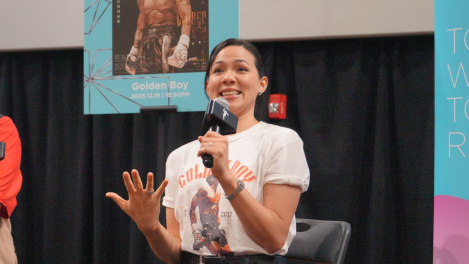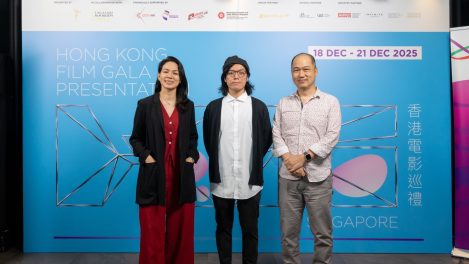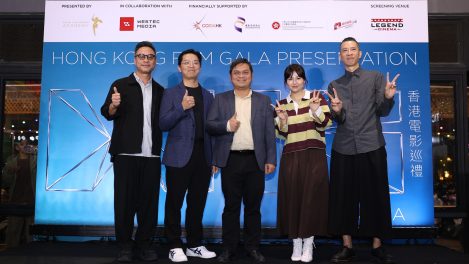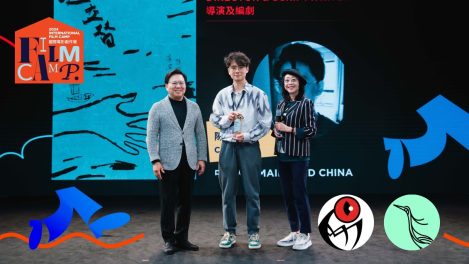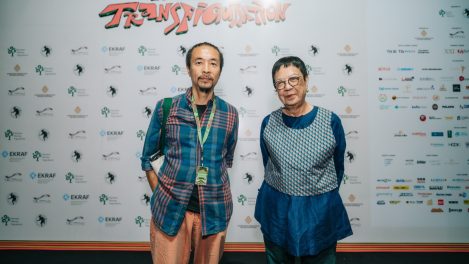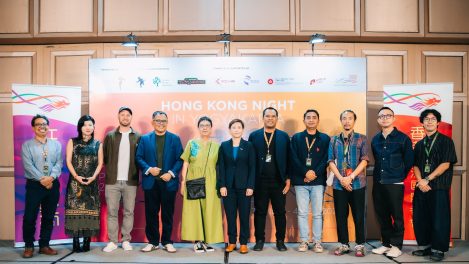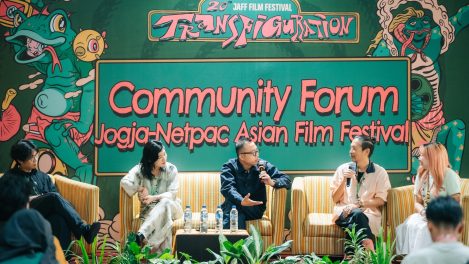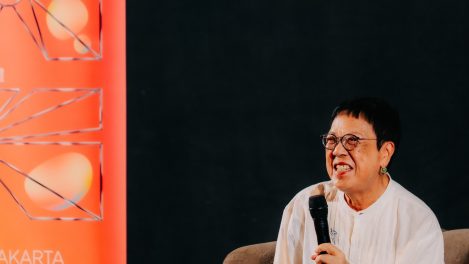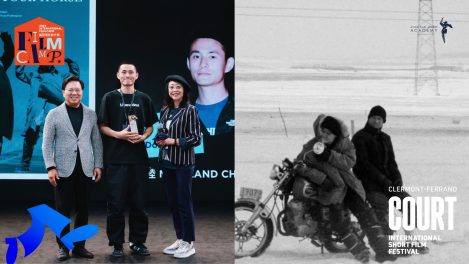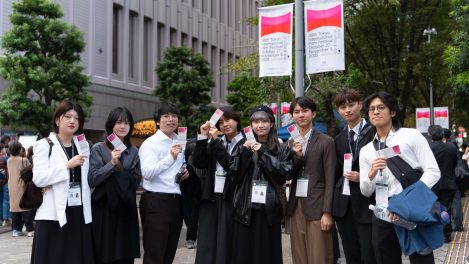Asian Cinerama – 18th Asian Film Awards Selection Draws Full Houses
Featuring ten AFA18-nominated films, the programme brought together international filmmakers, star-studded appearances, and lively post-screening Q&As.Asian Cinerama – 18th Asian Film Awards Selected Films, presented by the Asian Film Awards Academy in collaboration with Broadway Cinematheque, took place from 14 to 16 March 2025. Supported by the Cultural and Creative Industries Development Agency and the Film Development Fund, the three-day celebration showcased eight AFA-nominated titles and two special screenings, including two Hong Kong premieres. With every screening sold out and Q&As sparking engaging dialogue, the event reflected the city’s growing enthusiasm for Asian cinema.


The programme opened with Happyend, a futuristic coming-of-age story nominated for Best New Director and Best Newcomer. Director SORA Neo joined a post-screening Q&A with AFA18 Youth Ambassador LO Chun Yip, where they discussed the film’s portrayal of a repressive society and the friendship between two teenage boys. Neo shared that the story was originally envisioned on a larger scale, but budget constraints led him to focus on a more intimate narrative. He also spoke about the film’s sound design, set in a future where AI-generated music dominates the mainstream. In contrast, the characters gather at underground raves to spin and mix their own techno as a subtle act of rebellion.


All We Imagine as Light uses the lens of everyday life to explore city living, cultural diversity, and womanhood. Director Payal KAPADIA, nominated for Best Director, explained how Mumbai’s complex mix of languages and cultures — much like Hong Kong’s — shaped by its colonial past. During the Q&A, she was joined by actress Divya PRABHA (Best Supporting Actress nominee), editor Clément PINTEAUX, cinematographer Ranabir DAS, and producer Julien GRAFF. PRABHA shared how the role deepened her understanding of women’s lives under patriarchy, while the visual team discussed drawing inspiration from female photographers to craft the film’s distinct aesthetic. The discussion also touched on themes of disconnection, community, and belonging, and ended with warm applause from the audience.


Meeting with Pol Pot, which revisits the trauma of the Khmer Rouge era, was explored in depth during a post-screening Q&A with screenwriter Pierre Erwan GUILLAUME, editor Matthieu LACLAU, and producers Justine O and Catherine DUSSART. To avoid directly depicting violent historical events, the team used figurines and archival footage to maintain emotional distance and create space for reflection. DUSSART shared that, due to the difficulty of casting someone as Pol Pot, director Rithy PANH stepped into the role during filming — with the character’s face deliberately obscured to symbolically reject sympathy for the dictator.


All the Long Nights, nominated for Best Supporting Actor, Best Screenplay, and Best Original Music, was followed by a thoughtful Q&A with director-screenwriter Sho MIYAKE, co-writer Kiyoto WADA, and composer Hi’Spec. Despite centring on a young man and woman, MIYAKE clarified that the film isn’t a romance, but rather a reflection on work and how people seek meaning and fulfilment in their everyday lives. He deliberately avoided dramatising the characters’ illnesses, opting instead to portray their quiet wish for a simple, peaceful life. Hi’Spec described the collaboration as joyful, and together they crafted a gentle, textured soundscape that served as an emotional undercurrent throughout the film.


Black Dog, nominated for five major awards including Best Film, Best Director, and Best Actor, was followed by an engaging Q&A with director GUAN Hu, lead actor Eddie PENG, and producer LIANG Jing. The film follows a recently released ex-convict and the unlikely bond he forms with a stray black dog. GUAN shared his belief that dogs can feel human emotions, and he approached the characters as true companions. Filming in the remote Gansu region gave the story a rugged texture drawn from the land’s own history. PENG spoke about the quiet intensity of his character, describing it as an exploration of the darker emotions we often suppress. The film’s raw emotion and striking visual language were praised by audiences.


Exhuma, which earned 11 nominations at this year’s Asian Film Awards, was one of the highlights of the screening programme. Director JANG Jae-hyun and producer KIM Young-min attended the post-screening Q&A, where JANG shared that the film was not originally intended as a horror story, but as a way to explore collective memory through the cultural ritual of grave exhumation. He also spoke about the influence of Hong Kong cinema on his work, naming Mr. Vampire as a personal favourite. One haunting scene — a hearse weaving through a dark forest — left a lasting impression on him and inspired similar imagery in Exhuma as a tribute to classic Hong Kong genre films.


Shambhala, nominated for Best Cinematography and Best Costume Design, was presented with a post-screening Q&A featuring director Min Bahadur BHAM, cinematographer Aziz ZHAMUBAYEV, and costume designer Ramlal KHADKA. BHAM revealed that the story was inspired by a vision he had as a child while meditating with his father — an image of a past life as a Himalayan mother. After seven years developing the script, the team journeyed to remote mountain villages to conduct research and connect with local communities. Their immersive approach resulted in a poetic blend of realism and mysticism, warmly received by audiences.
In addition to the eight nominated titles, this year’s Asian Cinerama featured two special screenings — Last Mile and Perfect Days — along with the Hong Kong premiere of the nominated film Harbin, all of which received enthusiastic responses.


Directed by Ayuko TSUKAHARA, Last Mile was presented as a special screening, with the director joined by AFA18 Ambassador Dean FUJIOKA and Youth Ambassador OKADA Masaki for the post-screening Q&A. Their appearance was met with enthusiasm, sparking lively dialogue during the Q&A session. TSUKAHARA spoke about her vision of building a shared universe across her works, using the logistics industry as a lens to explore overlooked details and the pressures faced by everyday workers. OKADA shared that he visited a warehouse to better prepare for his role, while FUJIOKA reflected on portraying a conflicted character and praised the director’s nuanced use of sound design.


Perfect Days featured a special appearance by this year’s Lifetime Achievement Award recipient, YAKUSHO Koji. He thanked the Hong Kong audience for their lasting support of the film, which has been screening internationally for over a year. During the Q&A, he shared insights from working with German director Wim Wenders, who sought to depict Japanese life from an outsider’s perspective and encouraged the cast to contribute their own views. Reflecting on his role as Hirayama, YAKUSHO said the experience helped him rediscover the beauty of small, everyday moments — a journey that was both personal and quietly healing. The audience responded with heartfelt applause.
Harbin, starring HYUN Bin, Park Jeong-min, Jo Woo-jin, JEON Yeo-been, YOO Jae-myung, and PARK Hoon, made its Hong Kong premiere as part of the programme. Nominated for Best Cinematography, the film played to a full house and received a warm and enthusiastic reception from the audience.
Across all three days, screenings were sold out, with post-screening Q&As filled with insight, applause, and thoughtful engagement. Asian Cinerama not only built excitement for the upcoming Asian Film Awards but also created a rare opportunity for audiences to connect directly with filmmakers and immerse themselves in the richness and diversity of Asian cinema.
Please contact us if any questions,
Email: info@afa-academy.com
Tel: +852 3195 0609
Website: www.afa-academy.com


